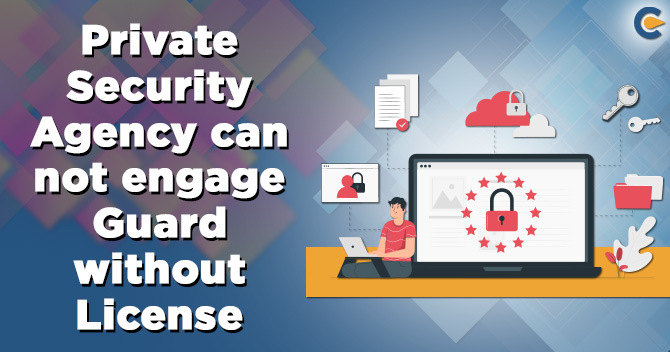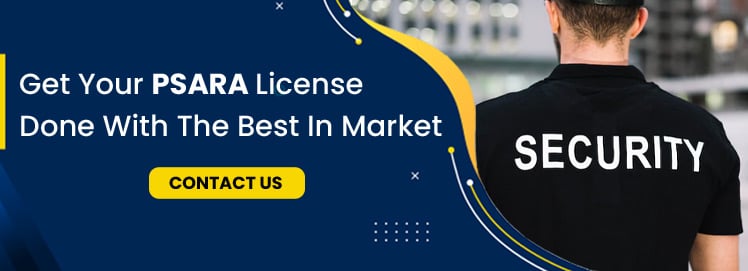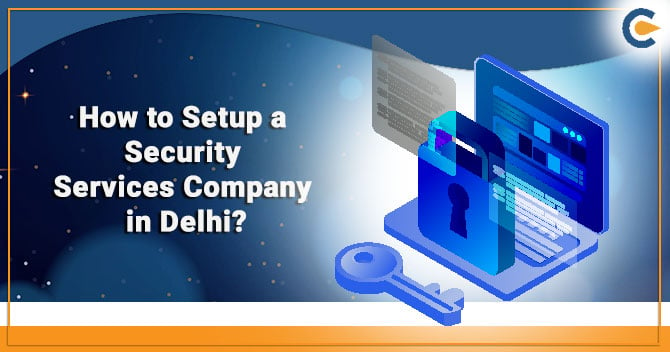Private Security Agencies are those agencies that provide security services including training of security guards. According to PSARA Act[1], all Private security agencies are required to appoint supervisors to supervise the work of security guards. The agencies should provide the necessary training and skills to the supervisors. While engaging a supervisor, a person from the army, navy, or air force must have at least 3 years of experience who must be preferred as supervisor. The Act also specifies the criteria for the qualification and disqualification for a security guard, the health condition as well as about the uniform of the security guards.
Persons or Private Security Agency, must not engage or provide Private Security Guard without License
Section 4 of the Act clearly states that no person will carry on or commence the business unless he holds a license issued under this PSARA act to have private security agency. It is provided if any person carrying a business of private security agency, immediately before the commencement of this Act, he may allowed to continue so for a period of one year from the date of such commencement. By that time he has to make an application for such license within the period of one year.
It is also provided further that no private security is given in abroad by the private security agency without obtaining permission of the Controlling Authority. The Authority must liable to consult from the Central Government before granting such permission to the agency. The Agency will get the PSARA license when an application for issue of license is made under this Act. The application will only be considered from a person after making due verification of his antecedents.
Manner of making Application for Grant of License in Delhi
- Every application is made under section (1) of section 7 of the Act, by an Agency for the grant of a license to the Controlling Authority as prescribed in Form V.
- Every application as referred to in sub-rule (1) must be accompanied by specified fee as given under sub-section (3) of section 7 of the Act. It must be paid in form of crossed bank draft/demand draft or a banker’s cheque payable to the Controlling Authority, as mentioned below:-
- Rs 5000, if the private security agency is operating in one district
- Rs 10000, if the private security agency is operating in more than one to five districts
- Rs 25000, if the private security agency is operating in the whole of National Capital Territory of Delhi.
- Every application as referred to in sub-rule (1) must be either delivered personally by the applicant or sent by his representative to the Controlling Authority
- On receiving the application as referred to in sub-rule (1), the Controlling Authority shall grant an acknowledgment to the applicant after noting the date of receipt of the application.


Verifying the Character and Antecedents of the Applicant
- Every applicant when makes an application for the issue of fresh license or renewal of license to the Controlling Authority must enclose Form-I for verification of its antecedents. In case, if applicant is a company or a firm, separate Form-I for every proprietor, partner or director, majority shareholder, as the case may be, must be enclosed, as if they are also the applicants.
- On receiving an application, the Controlling Authority or any officer authorized by him forward the application to Deputy Commissioner of Police of that concerned police district where the agency intends to commence its activities.
- They verify the contents of the application, and also verify the particulars of an applicant. Thereafter forward it to the Deputy Commissioner of Police, Special Branch, Delhi and, make such inquiry, as he considers mandatory.
- For verification, the Controlling Authority or any officer authorized by him must obtain few credentials.
Those are as follows:-
- No objection certificate from the Deputy Commissioner of Police
- The verification report of particulars of the applicant and every other person in whose name the antecedent form is filled up, from the Deputy Commissioner of Police, Special Branch.
- The Deputy Commissioner of Police of the concerned police district must provide the no-objection certificate within thirty days of receiving the application from the Controlling Authority.
- The Deputy Commissioner of Police, Special Branch, must provide the verification report within thirty days of receiving of the application to the Controlling Authority containing with the following information as below:
- Details of the applicant if he is or was indulge in the activities which are prejudicial to national security or public order,
- Details of the applicant if he operated any agency either individually or in a partnership prior to it,
- Details of the applicant in case he possesses any special qualification or skill which may be considered to be facilitating the operations of the agency.
Read our article:Private Security Agency (PSARA) License Renewal and Cancellation Process in Uttar Pradesh
Verifying the Character and Antecedents of the Guard
- The person must be engaged or employed as a guard by the agency if he complies with the conditions provided in section-10 of the Act. The agency has to satisfy with the character and antecedents of such person in the following manner:-
- After verification of the character and antecedent of guard by the agency themselves
- After having character and antecedent verification certificate produced by the person himself. The certificate is valid only when the agency has no adverse report from any other source regarding his character and antecedent
- After having the report of character and antecedent received from the Deputy Commissioner of Police or by any other equivalent officer
- A person must submit the information in Form-II to the agency who is seeking employment as a guard. The separate forms have to be submitted for each district in case the person has stayed in more than one district during the last five years.
- The agency can make an inquiry for verification of the particulars of the person seeking employment as guard, either by itself or the agency can forward Form-II to the concerned Deputy Commissioner of Police or the Superintendent of Police for the verification.
- The person must submit the verification charges as mentioned in sub-rule (9) in respect for verification of character and antecedents by the concerned Deputy Commissioner of Police or the Superintendent of Police.
- The concerned Deputy Commissioner of Police or the Superintendent of Police will establish the identity and verify the character and antecedents of the person. They have the authority to make inquiries from the respectable residents within the locality and can also visit the place of his residence to look into the record from the concerned police station.
- The concerned Deputy Commissioner of Police or the Superintendent of Police must provide the character and antecedent verification report within thirty days of receiving the Form-II to the designated officer of the agency.
Following information should be provided:-
- The comments of the police upon the particulars filled by the person in the Form-II
- A general report about the activities including his means of livelihood during the period of verification
- Details regarding the criminal investigation or proceedings, registered or commenced or pending or disposed of at any point of time
- Information regarding his conviction, if any, in criminal offense punishable with imprisonment
- Information about the engagement or employment of such person will pose a threat to national security or not.
- The character and antecedent verification report must be graded as confidential and forwarded in the sealed cover. The validity of reports last for three years from the date of verification.
- On the basis of the character and antecedent verification report provided by the concerned police station or of the Deputy Commissioner of Police of the concerned district, the agency must issue a character certificate to the person in Form III. This certificate must not be taken back even if the person ceases to be the guard of the agency.
- For the verification of character and antecedents of a person to be employed by an Agency as Guard, a prescribed fee of Rs. 250 must be payable to the concerned Deputy Commissioner of Police or the Superintendent of Police either by way of cash or by bank draft.
Training of Guards
- The training of guards is very essential for which the Controlling Authority has to frame the syllabus that contains details of the training. The duration of the training must be of hundred hours for a minimum period with theoretical instruction. The sixty hours of practical training, spread over at least for twenty working days. The ex-serviceman and former police personnel must only be required to attend a condensed course only, which is of minimum forty hours of classroom instructions and sixteen hours of field training spread over at least seven working days.
- The training will include the following subjects:-
- Conduct in public
- Correct wearing of uniform
- Physical fitness training
- Physical security, security of the building or apartment, security of the assets, household security, personnel security
- Fire fighting
- Crowd control
- First-aid
- Examination of identification papers such as identity cards, passports, and smart cards, etc
- He must know English both able to read and understand alphabets and Roman numerals for normal identifying documents, arms license, travel documents and security inspection sheet
- Identification of improvised explosive devices
- Crisis alerts and disasters management
- Defensive driving
- Handling and operating of non-prohibited weapons and firearms
- Knowledge of Indian Penal Code, right to private defense, procedure for lodging first information report in the police station, some of Arms Act and Explosives Act
- Know Badges of rank in police and military forces
- Identifying types of arms in use in public and by the Police
- Use of security equipments and devices such as security alarms and screening equipments
- Possess the quality of leadership and management
- Observations, handling unidentified objects, handling equipments, conducting anti-sabotage checks, and special requirement for those who have to do body protection.
- The security guard must have to successfully undergo the training as given by the Controlling Authority in training institutes or organizations recognized by it. On completion of the training, the successful trainee must be awarded with the certificate in Form-IV by the recognized training institute.
- For the purposes of imparting training, the Controlling Authority can frame the guidelines and specifications for recognizing the institute or organization.
- The officer authorized by the Controlling Authority must carry out regular inspections of the recognized institute or organization for this purpose. In case the institute ceases to comply with the requisite guidelines and specifications, it can recommend de-recognition of such institute or organization.
- On receiving the recommendation from the inspection officer, the Controlling Authority can after affording a reasonable opportunity to the institute, de-recognize the institute or organization.
- A recognized training institute or organization has to submit the following details to the Controlling Authority:-


Physical standards for the Guards
- The person requires to have the following physical standards who must be employed or engaged as a guard such as:-
- Height: 160 cms for male and 150 cms for females. Exception to a person belonging to the Gorkhas, or Nepalies or Sikkimese or Scheduled Caste or Scheduled Tribe is eligible for relaxation of height by 5 cms.
- Weight: Must according to stand table of height and weight
- Chest: Measurements 80 cms with an expansion of 4 cms (for females no minimum requirement for chest measurement)
- Eyesight: Distant vision 6/6, near vision 0.6/0.6 with or without correction, free from color blindness. He must be able to identify and distinguish color display in security equipments and also be able to read and understand display in English alphabets and Roman Numerical
- Hearing: Free from defect and must be able to hear and respond to the spoken voice and also know the alarms generated by security equipments
- Free from knock knee and flat foot: He must able to run one-kilo meter in 6 minutes for the age group between 18 to 30 years and 8 minutes for the age group between 31 to 40 years. He must be able to walk one mile in 15 minutes for the age group between 41 to 50 years and in 17 minutes for the age group 51 and above
- No disease: He must not be suffering from a disease, which may limit the physical or mental capabilities in charging the security duties
- No handicap: He must not be suffering from any physical handicap or deformity, which may affect in good performance of duties as security guard
- Physical Strength: The guard must have dexterity and strength to perform searches, handle objects and use force for restraining the individuals in case of need
- The agency must ensure that every guard working under its control undergoes a medical examination from a Government or recognized hospital once in a year for ensuring the physical standard prescribed in sub-rule(1) of this rule.
Provisions for the Supervisors
- For the purpose of supervising the guards, the agency has to employ or engage one supervisor to supervise the work of not more than fifteen guards.
- In case the guards are deputed in different premises and it is not practical to supervise their work by one supervisor, the agency has to depute more number of supervisors so that there must be, at least, one Supervisor for every six guards for control, advice and supervision.
Conclusion
The operation of private security agencies is governed by the Private Security Agencies Regulation Act, 2005 (PSARA). Private security services are increasing with an increase in concerns about crime and terrorism. The concerned state government, where the private security agency is located has the power to regulate their affairs and may also formulate rules in respect of it. No private security agency can commence a business or provide a security guard without holding a license under PSARA.
Read our article:PSARA License: Renewal and Penalties













